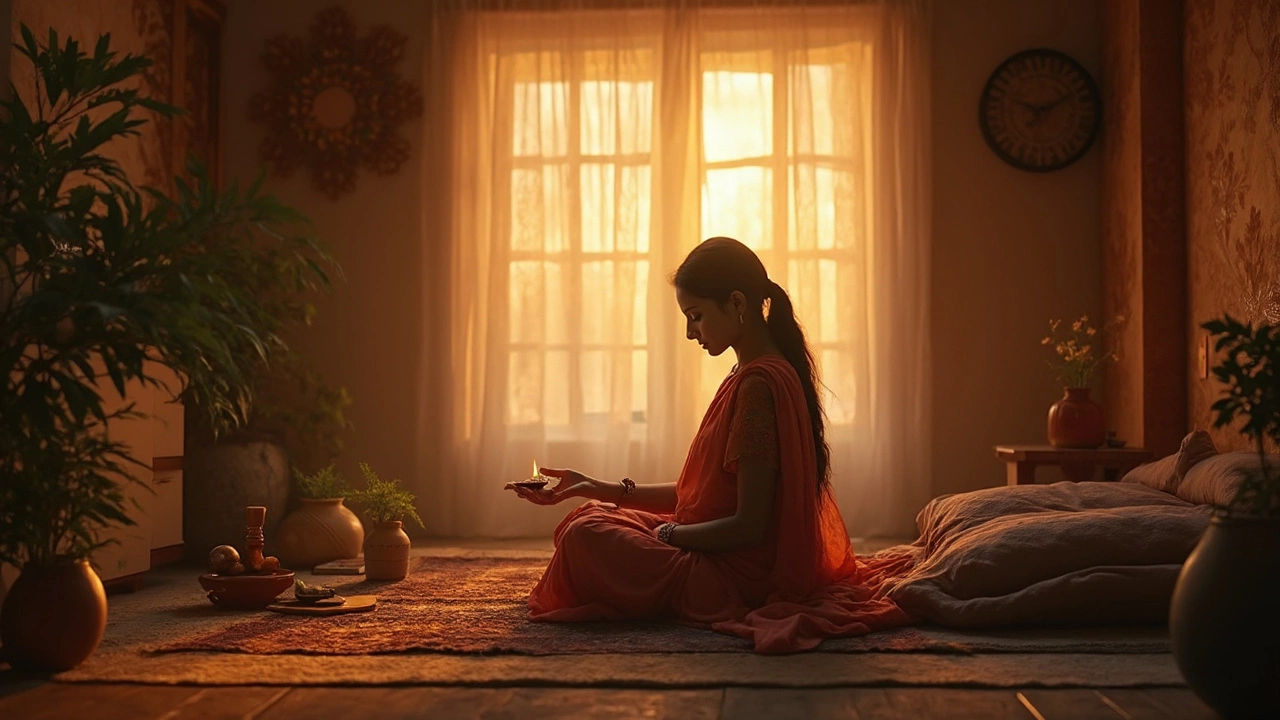
Ever wondered why you feel groggy after binge-watching shows past midnight, but oddly okay after an early night? Ayurveda has a solid take: the time you go to bed matters way more than you think.
Ayurveda tells us that humans are wired to sleep according to natural cycles—nothing fancy, just sunrise and sunset. This isn’t just tradition; there’s real science behind syncing with the body’s own clock, known as the dosha cycle. Ignore it, and you’ll usually pay with bad sleep or morning brain fog.
If you’re tired of waking up groggy, Ayurveda’s advice is clear—aim to sleep by 10 pm. That’s because your body shifts from a ‘winding down’ mode into a more active phase after this time, according to old Ayurvedic texts. Crash too late, and you fight against your own biology.
This isn’t about being rigid or ditching your social life. It’s about working with your body instead of against it. Even if you adjust by just 15-30 minutes, you might notice easier mornings, clearer thinking, and less afternoon slumps.
I’ll break down how this timing works, what actually happens inside the body at different hours, and some easy tricks to sneak closer to that sweet Ayurvedic bedtime—no raw turmeric shots required.
- The Ayurvedic Clock: Nature's Schedule
- Understanding Dosha Cycles at Night
- Why Timing Matters: Real-World Results
- Common Mistakes With Modern Sleep Habits
- Practical Tips for Hitting the Ayurvedic Bedtime
The Ayurvedic Clock: Nature's Schedule
Ayurveda doesn’t see time as just hours on a clock—it matches our daily life to cycles in nature. Think about how you feel at sunrise compared to the middle of the night; your energy patterns shift because your body lines up with these natural changes, even if you don’t realize it.
The key thing in Ayurveda is the Ayurveda sleep timing. Ancient Ayurvedic texts break the day and night into chunks based on “doshas”—Vata, Pitta, and Kapha. Each dosha has certain times when it’s more active, and this affects how you feel if you’re awake or asleep during those hours.
Here’s a basic breakdown of the Ayurvedic daily cycle:
| Time | Dosha | What Happens |
|---|---|---|
| 6 pm – 10 pm | Kapha | Your body and mind naturally slow down. Best time to relax, prepare for bed. |
| 10 pm – 2 am | Pitta | Body gets into repair mode—digestion and detox. Sleep now for true rest. |
| 2 am – 6 am | Vata | Mind is active. Early risers may find creative ideas and lightness here. |
So, why does Ayurveda care about these numbers? If you stay up late, you power through the quiet, restful Kapha phase and end up awake during the Pitta hours—when your body wants to work, not rest. Sleep experts now say something similar with “circadian rhythms,” showing people who stick to early nights get better quality sleep.
If you want to work with your body’s natural schedule, try these habits:
- Wind down before 10 pm—avoid anything too stimulating (think spicy food, intense TV, doom-scrolling on your phone).
- Eat dinner by 7 or 8 pm, so digestion is mostly done before sleep.
- Get sunlight during the day—yes, it really does help your body clock set itself.
You don’t have to follow these times perfectly (nobody’s perfect), but even small shifts can help. The Ayurvedic clock isn’t just old advice—it’s a practical guide for feeling more energetic and clear-headed every day.
Understanding Dosha Cycles at Night
Ayurveda says your body isn’t the same at all hours. Each night, your system cycles through three doshas: Kapha, Pitta, and Vata. Knowing what these mean makes it way easier to figure out why your sleep quality changes based on when you call it a night.
Here’s the basic nighttime rundown:
- Kapha (6 pm to 10 pm): This is your natural wind-down period. Kapha is heavy, slow, and calming, perfect for getting sleepy. If you crash during this window, your body falls asleep faster and deeper.
- Pitta (10 pm to 2 am): Surprisingly, this is your inner ‘get stuff done’ time — just when you should be snoozing. Pitta cranks up internal heat, liver cleansing, and repair work. If you’re up late, you’ll feel a second wind and might reach for snacks or start overthinking, but your body needs this time for repair, not emails or scrolling.
- Vata (2 am to 6 am): This is dreamland — a phase of light, active sleep. Your mind starts to sift through memories and imagination takes over. Waking up during Vata time means you’ll likely feel lighter and more creative, as long as you slept early enough.
If you want to see it all laid out, here’s a table with typical dosha cycles at night:
| Time | Dominant Dosha | What Happens |
|---|---|---|
| 6 pm – 10 pm | Kapha | Body cools down, gets heavy, preps for sleep |
| 10 pm – 2 am | Pitta | Body repairs, detoxifies, mind may get active if awake |
| 2 am – 6 am | Vata | Mind dreams, memory sorting, lightest sleep phase |
If your bedtime regularly lands outside the Kapha phase, you’re fighting your natural rhythm. This is why people who work late night shifts or always stay up past 11 pm often say they never feel truly rested, no matter how many hours they log. Aligning with these cycles is a simple, no-cost life upgrade for better sleep and more productive days.

Why Timing Matters: Real-World Results
This isn’t just a theory from ancient books. The time you hit the sack actually impacts your mind and body in real life. Ayurveda links this to our body clock or circadian rhythm—backed up by a ton of modern research. Going to bed by 10 pm puts you in sync with your natural sleep-wake cycle, making it easier to fall asleep deeply and wake up refreshed.
When you stay up past 10-11 pm, your body moves into a more "Pitta"-driven phase. Ayurveda describes this as a time when the body gets active, maybe you’ve felt that second wind or hunger strike late at night? That's your system trying to digest and repair. Staying up during this phase makes your body work overtime, using up energy that should be going to natural cleanup and repair jobs overnight.
You might notice:
- More trouble falling asleep the later you stay up
- Lighter, more restless sleep
- Grogginess on waking (even after 8 hours in bed)
- Mood dips and brain fog through the day
- Cravings for sugar or caffeine in the afternoon
The data backs this up. In a 2022 Indian study, people who regularly slept by 10 pm—following the Ayurvedic "Kapha" phase—reported fewer digestive problems, better mood, and less fatigue compared to those who went to bed after midnight.
| Bedtime | Reported Fatigue | Digestive Issues | Morning Alertness |
|---|---|---|---|
| By 10 pm | 15% | 10% | 80% |
| After Midnight | 45% | 32% | 34% |
When you stick to the Ayurveda sleep schedule, you’re helping your body get the deep rest it needs for repair and hormone balance. Go against it, and you’re more likely to get knocked off track—think tired afternoons, mood swings, or that annoying bloated feeling after eating.
The bottom line? Timing isn’t just about hours logged in bed. It’s about working with your biology—so sleep feels like actual rest, not just a time-out.
If you remember one thing, it's this: the Ayurveda sleep window is your secret weapon to feeling better overall, and your alarm clock (and coffee budget) will thank you for it.
Common Mistakes With Modern Sleep Habits
Most people know they should get enough sleep, but today's habits push us away from what Ayurveda recommends. It’s not just about how much you sleep—when you sleep is key too. The big problem? Technology, late dinners, and a jam-packed schedule completely ignore our body's natural clock.
One huge mistake is using screens late at night. Phones, tablets, and TVs give off blue light, which tricks your brain into thinking it’s still daytime. This messes up melatonin—the hormone that helps you sleep. According to the Sleep Foundation, “People exposed to blue light before bed can take twice as long to fall asleep compared to people who stay off screens.”
"Your body’s need for rest is wired to cues from nature, not Netflix releases." – Dr. Suhas Kshirsagar, author and Ayurvedic physician
Another issue? Eating big meals late in the evening. Ayurveda says your digestive fire (agni) slows way down after sunset. If you’re scarfing pizza at 10 pm, your body can’t process it well. That leads to restless sleep and grogginess the next day. Research shows that late-night eating doesn’t just make you feel sluggish—it’s also linked to higher blood sugar and even weight gain.
Here’s a quick look at how modern habits stack up against Ayurveda’s advice:
| Modern Habit | Ayurvedic Recommendation | Impact |
|---|---|---|
| Scrolling till midnight | Wind down by 9:30 pm | Poor sleep, hard mornings |
| Late-night snacking | Finish dinner by 7 pm | Digestive issues, grogginess |
| Unpredictable sleep times | Stick to a regular schedule | Mood swings, brain fog |
The truth is, you can't hack your way out of biology, no matter how strong your coffee is. Ignoring your natural rhythm makes you tireder in the long run, not more productive.
If you want to fix your sleep, start putting your phone down an hour before bed, and aim to finish dinner early. Even small tweaks—like going to bed 15 minutes earlier or dimming your lights in the evening—help get your Ayurveda sleep timing back on track.

Practical Tips for Hitting the Ayurvedic Bedtime
Getting to bed by around 10 pm is the sweet spot in Ayurveda, but let’s be real—life gets busy, and routines can get weird. I’ve pulled together practical moves to make this Ayurvedic advice actually work in the real world. You don’t have to overhaul your life all at once. Small changes stacked up over time beat one big unsustainable leap.
- Set an alarm—at night, not just in the morning. Try an evening alert at 9:30 pm to remind yourself to start winding down. Your brain gets a heads-up that it’s almost bedtime.
- Turn off screens 30–60 minutes before sleep. Studies show blue light from phones and laptops can mess with your melatonin levels, making it harder to fall asleep on time. If you can, swap scrolling for reading or chatting with family.
- Get outside early in the day. Just 15–20 minutes of morning sunlight tells your body’s clock when to wake up and, most importantly, when to get sleepy later.
- Stick to lighter, earlier dinners. According to Ayurveda, eating late keeps your system working overtime at night, stealing time from good rest.
- Don’t hit the gym late. Exercising after 8 pm can push your body into a second wind—great for energy, bad for falling asleep by 10.
- Create a simple wind-down routine. Even just brushing your teeth, washing your face, and changing into PJs in the same order each night tells your brain to get ready for sleep.
If the idea of going to bed by 10 pm sounds impossible, start by moving your bedtime 10–15 minutes earlier every few nights. Eventually, your body adapts—and you’ll notice mornings get a whole lot easier.
Here’s a breakdown from a 2021 sleep survey, showing how shifting sleep times can affect how people feel in the morning:
| Bedtime | % Reporting "Easy Wake-Up" |
|---|---|
| Before 10:00 pm | 72% |
| 10:00–11:00 pm | 58% |
| After 11:00 pm | 36% |
Turns out, getting your sleep schedule aligned with nature doesn’t just sound good—it makes real-life mornings way less painful. Try a couple of these tweaks, and see how your body responds. Sticking closer to that Ayurvedic rhythm might be the easiest health upgrade you make all year.





Rohan Talvani
I am a manufacturing expert with over 15 years of experience in streamlining production processes and enhancing operational efficiency. My work often takes me into the technical nitty-gritty of production, but I have a keen interest in writing about medicine in India—an intersection of tradition and modern practices that captivates me. I strive to incorporate innovative approaches in everything I do, whether in my professional role or as an author. My passion for writing about health topics stems from a strong belief in knowledge sharing and its potential to bring about positive changes.
view all postsWrite a comment